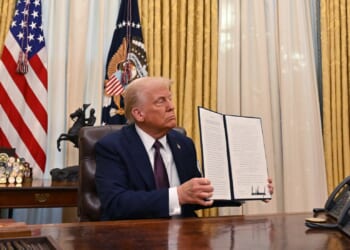Trade provides mutual benefit. Otherwise, people would not engage in it. Specialisation is more efficient and allows greater prosperity than in a subsistence economy where we scrabble about trying to do everything for ourselves. Adam Smith illustrated the advantages of the division of labour with the example of the pin factory – comparing the output with 18 workers each doing a specific task, with one worker laboriously going through each process himself to make a pin. That was in his book, The Wealth of Nations, in 1776. Of course, the benefit of trade applies not just to those trading within a country but also to those trading with people abroad. It follows that the Government should endeavour, wherever possible, to keep out of the way – as preventing trade from taking place is harmful.
Forgive me if these messages are obvious to you; such insights have been widely accepted for nearly 250 years. But these arguments are never settled – even when some of us regard the case as overwhelming. Intelligent, knowledgeable people I usually agree with are among the advocates for protectionism. I was dismayed to hear Danny Kruger MP making such a case at the National Conservatism conference three years ago. Just some personal eccentricity, I thought. But then last month we had the Alliance for Responsible Citizenship in London where the audience voted for protectionism. Tony Abbott and Daniel Hannan, proposing that “protectionism makes us poorer” were narrowly defeated by Oren Cass and Michael Gove.
Even among those who accept the general case for free trade, there are many who suggest the only problem with tariffs is that other countries will retaliate with their own. Indeed, it is suggested that it is right and proper for us to retaliate with tariffs against countries imposing them on us. It follows from this line of thinking that free trade should only be advanced with a deal – lengthy and complicated negotiations with lots of damaging caveats and exceptions.
Some trade negotiators stress the merits of bilateral agreements, others of multilateral ones. I’m a unilateralist. Unlike the debate about nuclear disarmament in the 1980s, a unilateralist embrace of free trade is in our country’s interest. It would not stop us from signing treaties with other like-minded countries. Codifying such arrangements provides clarity and confidence that they won’t be disrupted. Such arrangements can certainly offer great advantages. The UK joining the Comprehensive and Progressive Agreement for Trans-Pacific Partnership gave us an extra celebration last Christmas. There might be exceptions where we restrict trade for non-economic reasons – the sanctions on Russia come to mind.
But as the world hurtles towards the mercantalist madness, the UK should stride unconditionally and without delay towards the opposite path of enlightenment. Lifting tariffs on the United States would be a topical place to start. We dodged the bullet of being in the EU Customs Union and thus we have an independent trade policy. Why not make the most of it? Why do we impose ten per cent tariffs on imported American cars? We don’t have tariffs on German cars. We should abolish that tariff and allow the British consumer to benefit from greater competition. It is likely that Donald Trump would lift the 2.5 per cent tariff on imported British cars. But even if he didn’t, it would still be beneficial for us.
The US has proposed a 200 per cent tariff on wine and other alcoholic drinks imported from the EU. Thanks to Brexit that does not apply to us – particularly important for our Scotch Whisky. Why don’t we scrap our tariffs on American wine?
We should lift our tariffs on steel from American and other countries. The great majority of our steel is already imported. By making it more expensive we damage a great range of our industries – including in manufacturing whose ability to compete in world markets is thus harmed. If we want to keep our steel industry going then subsidies would be a less damaging way to do so – also, of course, reducing its energy bills by ditching net zero targets.
Last year we used our Brexit freedoms to lift tariffs on orange juice, almonds and tofu among other things. But, as Catherine McBride says:
“The UK’s entire tariff structure requires a fine-tooth comb, to eliminate tariffs and quotas on the goods that we don’t or can’t produce in the UK. There are literally hundreds of products: rice, buckwheat, millet, quinoa, cocoa butter, cocoa powder, roasted coffee, green tea, ground pepper, vanilla, cloves, pineapples, mangoes, avocados, dates, figs, bananas, oranges, lemons, grapes, watermelons, apricots, peaches, kiwifruit, yams, sweet peppers, asparagus, olive oil, palm oil, sunflower oil, coconut oil, soy oil, linseed oil, sesame oil, fruit juices, preserved vegetables, I could go on, but I am sure you get the idea. We add tariffs to imports of all of these foods.”
That should be just the start. Countries that adopted free trade – such as Hong Kong, Singapore, Switzerland and New Zealand found they became richer. Javier Milei would like to see Argentina embrace free trade with the United States and others – but is constrained by being in the Mercosur customs union with Brazil, Paraguay, and Uruguay.
When Ronald Reagan was the US President he spoke up powerfully for free trade:
“You see, at first, when someone says, “Let’s impose tariffs on foreign imports,” it looks like they’re doing the patriotic thing by protecting American products and jobs. And sometimes for a short while it works – but only for a short time. What eventually occurs is: First, homegrown industries start relying on government protection in the form of high tariffs. They stop competing and stop making the innovative management and technological changes they need to succeed in world markets. And then, while all this is going on, something even worse occurs. High tariffs inevitably lead to retaliation by foreign countries and the triggering of fierce trade wars. The result is more and more tariffs, higher and higher trade barriers, and less and less competition. So, soon, because of the prices made artificially high by tariffs that subsidize inefficiency and poor management, people stop buying. Then the worst happens: Markets shrink and collapse; businesses and industries shut down; and millions of people lose their jobs.”
A pity the current incumbent in the White House does not see it this way.
Jon Moynihan, in the second of his books, Return to Growth, refers to data from the Fraser Institute and others:
“Trade liberalism is correlated with economic growth. The growth in a protectionist versus a liberal country is, the regression implies, up to 1.5 percentage points per annum less. This is generally accepted, yet the UK’s trade freedoms have diminished in recent years.”
The Prime Minister insists that the Government’s “central mission is to grow the economy.” On Friday came the news that the economy shrank in January. If he wants to do better then he should open up the economy with a radical, confident policy of free trade. It would be ironic given all the effort he made to thwart Brexit that it offers him the chance to achieve his principal objective. So he might get teased a bit. That would be a modest burden for him to bear, compared to the alternative of four years of stagnation and the verdict he would face for that.






![Trump's Admin Guts Another ‘Rogue Government Agency with Zero Accountability’ [WATCH]](https://www.right2024.com/wp-content/uploads/2025/03/Trumps-Admin-Guts-Another-‘Rogue-Government-Agency-with-Zero-Accountability-350x250.jpg)
![‘We All Owe Him (Elon) a Huge Debt of Gratitude’ [WATCH]](https://www.right2024.com/wp-content/uploads/2025/03/‘We-All-Owe-Him-Elon-a-Huge-Debt-of-Gratitude-350x250.jpg)









